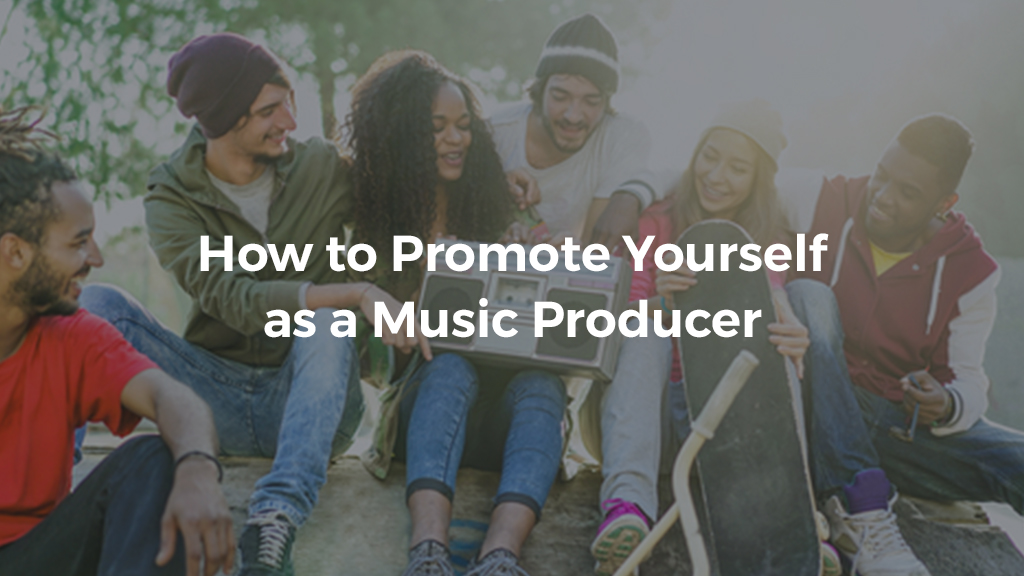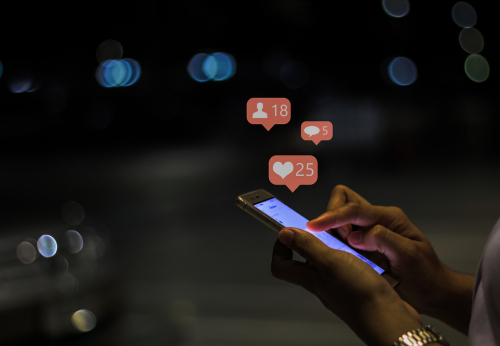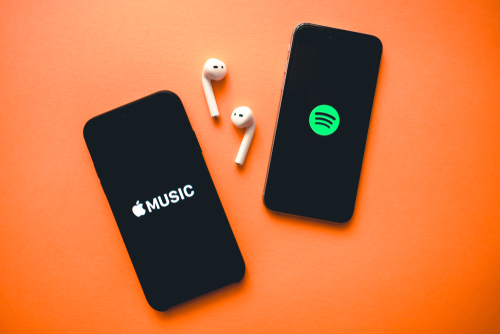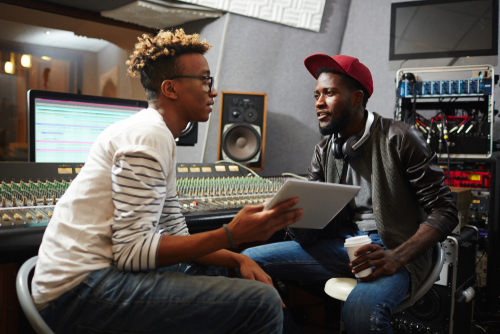Blog
How to promote yourself as a music producer
It’s not like it used to be, right? The internet has taken major chunks out of the major labels, and has democratized the production and distribution of music, so anyone with a half-decent laptop can start making and uploading their tunes for all to hear.

So an independent musician can reach more ears than ever before, but that doesn’t make it easier to be successful as an artist or a producer. That democratization creates competition and leaves listeners overwhelmed by the huge amount of choice. Each artist now has to take charge of being their own publicist and marketing expert.
In this guide, we’ll shed some light on the work, the techniques and the mindsets that go into exposing your tunes, and show you how to promote your music online.
1. Keep it Real-Life
With the majority of your music being made on the computer, and listened to via the internet, it’s quite easy to forget the most powerful method of spreading ideas between people: the real world.
One of the best things you can do as a music producer is to be engaged with the real-world community around you. Get involved with local music events, keep in touch with other local artists, and attend relevant shows in your area. The people around you are much more immediately connected to you, and having met you, they’re far more likely to listen to your music than the average person who comes across you online.
2. Use Social Media Correctly
Once a great way to keep in touch with your friends and share updates, social media has become a hotbed of advertising, whether it’s obvious or not.
With so many brands, personalities and influencers competing for your attention – and everyone else’s – is social media really the right place for the starving artist to get the word out?
Despite all the noise, social media is indeed still a valid place to promote your music. With 3.5 billion users and growing, there may be a lot of brands online, but the number of people more than makes up for it.
How to Use Social Media to Promote your Music
Your use of social media should be natural and real. That means you should use your chosen platforms like a real person, and only throw in promotional posts occasionally.
Nobody wants to follow someone who’s only trying to persuade them to click on links. Instead of shoving your promo down people’s throats, simply use social media platforms as you would a personal profile, although centred around your music.
Here, the best way to promote your music to potential fans is to not do so. Primarily, post updates from the studio, interact with the community of similar musicians and share slightly more personal news. Save your promotional posts to use occasionally – stick to a rule of thumb that one in five posts will be promotional, while the other four should give an insight to people who are already fans.

Which Social Media Channels should I use?
The problem of social media is in the amount of time it takes. You may be tempted to get involved in multiple channels at once, but there’s a balance to strike between time spent on social media and… you know… time spent actually making music!
Choose a balance that works for you, selecting certain platforms where you’ll be active and others where you may have an account but only log in occasionally. An easy way to choose which platforms you’ll maintain a presence on is to consider which you’ve enjoyed using personally, and stick with what you know.
Social Media Channels – Strengths and Weakness for Musicians
One natural choice for musicians is Soundcloud, where you’ll find fans and other artists who can directly comment on your tunes, and do the same yourself. We’ll cover soundcloud more thoroughly in the next section, as it’s a distribution platform as well as a social media one.
Facebook doesn’t give much help to those uploading audio, but can easily host videos natively or via other sites. For its sheer dominance in its user base, Facebook is a very worthy platform to use, although it may restrict your posts from actually being seen by the fans who follow you. The focus of Facebook is to try to get Pages (artists, in this case) to pay in order to reach more people. You can’t argue with the size of its userbase, though.
Instagram is similarly massive, but as an image-led platform doesn’t necessarily lend itself to musicians unless what they do has a great aesthetic appeal. Do you have a studio full of fancy gear? Are you always travelling to play shows? If so, Instagram could be a good place for you to end up.
Twitter can act as a real-time platform for quick posts, but has little in the way of audio support and can be a very throw-away form of communication – don’t expect for your posts to stick in people’s minds forever. Nevertheless, there are plenty of musicians using Twitter who you may want to connect with and find out more from. The casual nature of Twitter may make people less likely to leave the platform and listen to what you have to offer.
3. Get your Music Distributed Properly
If you don’t have some kind of presence on the major channels of music distribution as possible, you won’t be in a good position to get the word out there.
Imagine a potential listener discovering something they like of yours on social media. They like the tune, they immediately cross over to Spotify… and nothing. If you don’t show up, that could mean the difference between a lifelong fan and someone who forgets all about you. Distribution is essential for getting and for keeping fans.
But how do you get your music on to Spotify, Apple Music, Tidal and other services?

The Biggest Distribution Channels for Music Producers
Soundcloud is a more visceral and immediate way to get your music out there, and it’s a great place for new listeners to discover you. There’s no status updates or image posting like social media, but for sheer exposure, it would be silly not to have a Soundcloud profile.
Spotify is the strongest music streaming platform, with 100 million listeners – and you get access to them when you sign up for Spotify For Artists. You can also join the programme as a member of some of the distributors we’ll mention below (Distrokid, CDbaby, EmuBands).
As the number two search engine in the world, YouTube is actually a hotspot for people looking for music. It’s worth approaching the platform with care, as the plays won’t earn you direct royalties but ad revenue instead – and only once you can demonstrate a certain number of plays per year and subscribers. When it comes to just music, it’s best not to think of YouTube as a distribution platform, but rather a chance for exposure. Make sure you link back to your other distribution platforms.
All-in-one Distribution Platforms
So how can you get your music onto other platforms such as Google Play, Amazon Music, Tidal, Apple Music and more?
Creating artist profiles on the various sites – if they even allow it at all – is time-consuming, and several one-stop distribution channels have risen up to take the work out, and even to provide some of the royalties due for you. Sites like CD Baby, Distrokid and EmuBands offer distribution to the above big players and other services. These services and others also often provide management and payment of earnings, and other perks for artists.
4. Branding for Musicians
You spend a lot of time making your music as professional and perfect as possible, and it’s well worth doing the same for the rest of your artist profile.
Consider somebody discovering your music. They’ve heard what you want them to, but if they start looking into you and your career, what will they see? Grainy photos taken from somebody’s phone camera, uploaded to a wordpress template website? Or a professional, well-lit photoshoot that puts you in line with today’s top artists.
This doesn’t mean you have to go the second route. Part of the appeal for certain artists and genres is the ability of a person to keep it real – stay themselves and keep uploading music with personality. Will your fans connect better with a professionally branded superstar, or with someone just like them? Often it depends on your type of music.
For example, Lo-Fi Hip Hop producer Sarcastic Sounds has managed to rack up a massive 1.2 million monthly listeners on Spotify, and his artist picture is…

Professional branding helps to keep you looking serious and appeals to the masses. On the other hand, relatively amateur branding means you’ll appear very down-to-earth a get the kudos of your listenership. Remember, you’re not just looking to show your chosen image to potential fans – you want it to be seen by promoters, live music organisers and the media. Define the type of fan, promoter and press person you want to appeal to, and use that as a template for artwork, profile images and web design.
How to Brand Yourself Professionally as a Musician
If you’re going with the first route and want to show professionalism, you’ll need people who know what they’re doing. It’s time to consult and pay professionals for high-quality photoshoots, web design, logo and track/album artwork. The investment is a large one, but after a couple of years, when your fans and listens have grown, you’ll be glad to be moving forward with a consistent, professional branding.
5. Play your Music Live
Live music used to be so good as a form of promotion that record labels used to use a band’s tour solely for that – to gain exposure for the band’s music, energise their fanbase and sell more copies of their record or CD. Live music is still a very strong way to show off your skills as an artist and get a larger fanbase.

Playing Live is one of the best ways to get out into the real world with your music, and any audience will be in prime position to become fans, thanks to the level of connection you can make to a live audience.
Being a live act is something of a chicken-and-egg scenario: once you’ve played live, you might pick up a few more fans, and once you can demonstrate this fanbase on social media, promoters of larger gigs are more likely to give you the opportunity to play larger shows, leading to even more fans.
And don’t forget the other artists you’ll meet when sharing a stage…
6. Collaborate with other Artists
Not only is collaboration a great way to learn new things about music production, but it’s also a good way to get your music out there.

In a promotional sense, collaboration with another artist serves to mix your fans and that artist’s fans together, offering a little flavour of the artist they know, and introducing them to one they might like to learn more about.
When choosing someone to work with, your primary focus should be on the fanbase they have already. What type of music does the artist make, and therefore what type of music do their fans tend to like? Musically, it might be interesting for a techno artist to collab with a jazz fusion quintet… but will there be much promotional crossover for the fans of each artist? This is an extreme example, but it illustrates how you should be thinking about collaborative opportunities.
Similar to collaboration is remixing. The opportunity to remix work by someone else gives their fans exposure to your work, and if you’ve done a good job, they might come back for more.
7. Find Your Niche and Work It
Why set your sights on seven billion people and miss when you can set your sights on 200,000 and hit the target?
One thing to realise about the internet. Yes, you can access an insanely large number of people, but those people are trying to be reached by an insanely large number of people. Conversations about how “It’s not as easy as it used to be”, or the idea that “it’s hard to break through these days” are technically correct, but only if you’re looking to be a middle-of-the-road, mass-market artist – they’re not true for everybody.
The trick to any established system – in this case, the system of listening to artists on the internet – is specialization. What’s more likely: that you’ll make it big in the $8bn EDM industry alongside everyone else who’s trying to? Or perhaps that you’ll make it big in a smaller genre like Synthwave or Chiptune, where the fanbase is smaller but more dedicated?
This idea of specialization is the real reason why genres exist in the first place. Audiences are constantly fractured into ever smaller groups, and instead of listening to ‘music’, we’re listening to ‘R&B’, ‘Trap’, ‘Liquid Drum n Bass' or ‘Instrumental Grime’. Each has a dedicated flavour that’s listened to by specific people, and those people go searching it out.
Being specialized as a musician doesn’t have to mean that you’re catering to a specific genre and its fixed set of standards. You could specialize in making music with a certain instrument, feeling, or based off a certain range of ideas. Anything recognizable – and recognizably different – could win you that separation from the rest of the crowd.

Still want more? Click here for 10 more online promotion tips.

